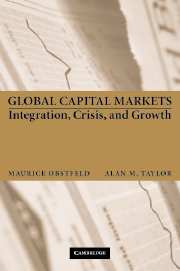Book contents
- Frontmatter
- Contents
- List of Tables
- List of Figures
- Acknowledgments
- Part One Preamble
- Part Two Global Capital in Modern Historical Perspective
- Part Three The Political Economy of Capital Mobility
- 4 Globalization in Capital Markets: A Long-Run Narrative
- 5 Monetary Policy Interdependence and Exchange-Rate Regimes
- 6 The Changing Nature of Government Credibility
- Part Four Lessons for Today
- Data Appendix
- Bibliography
- Index
6 - The Changing Nature of Government Credibility
Published online by Cambridge University Press: 03 February 2010
- Frontmatter
- Contents
- List of Tables
- List of Figures
- Acknowledgments
- Part One Preamble
- Part Two Global Capital in Modern Historical Perspective
- Part Three The Political Economy of Capital Mobility
- 4 Globalization in Capital Markets: A Long-Run Narrative
- 5 Monetary Policy Interdependence and Exchange-Rate Regimes
- 6 The Changing Nature of Government Credibility
- Part Four Lessons for Today
- Data Appendix
- Bibliography
- Index
Summary
It is widely believed that prior to 1914, gold-standard orthodoxy conferred credibility and was a sine qua non for access to global capital markets on favorable terms. A path-breaking study by Bordo and Rockoff (1996) found that adherence to gold-standard rules acted as a “seal of approval” for sovereign debt. Gold-standard countries had lower country risk, measured by their bond spreads in London relative to the British consol. This finding is consistent with the logic of the trilemma. Countries that embraced gold were viewed, by and large, as having forsworn activist macroeconomic policies, in favor of fixed exchange rates and a concomitant package of gold-standard rules guaranteeing freedom of international payments.
We have argued, however, that by the time the interwar gold standard was reconstituted starting in 1925, the underlying political equilibrium in most economies had changed. More political power had entered the hands of previously disadvantaged working class parties, and a greater awareness of government's role in steering economic outcomes prevailed. In the new political environment, the commitment to forgo policy activism implicit in pre-1914 gold-standard adoption was no longer necessarily credible. Indeed, divergent interest-group positions on macroeconomic policy were reflected in the high inflation rates rampant in the early 1920s and in the national debates over the appropriate exchange parity – devalued or not – at which to return to gold.
In this chapter, we seek hard evidence of a new political dynamic by asking if the relationship between country risk and gold changed after 1925. With the rules of the game in question after World War One, perhaps investors doubted that the mere adoption of a gold-standard regime would ensure the full repayment of public debts.
- Type
- Chapter
- Information
- Global Capital MarketsIntegration, Crisis, and Growth, pp. 195 - 226Publisher: Cambridge University PressPrint publication year: 2004



